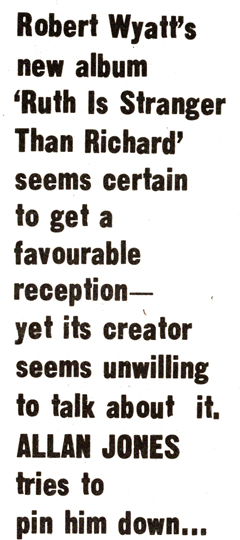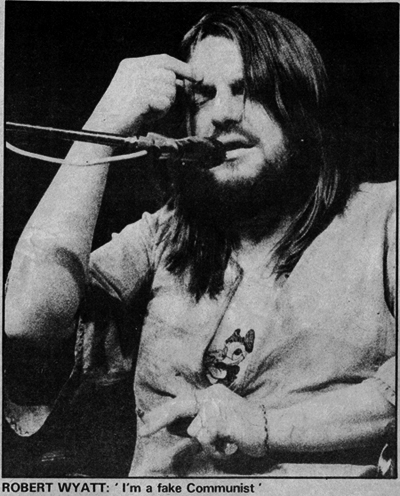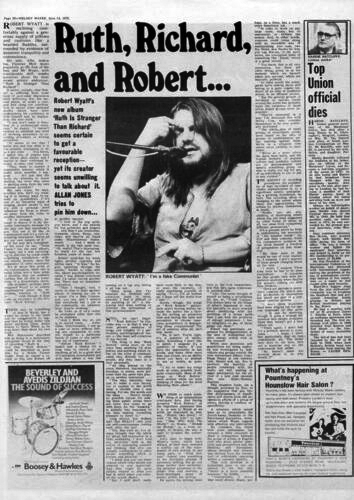| |
|
|
 Ruth, Richard, and Robert... - Melody Maker - June 14, 1975 Ruth, Richard, and Robert... - Melody Maker - June 14, 1975

|
ROBERT WYATT is reclining comfortably against a generous supply of pillows and cushions like a bearded Buddha, surrounded by evidence of domestic tranquility and convenience.
His lady, Alfie, makes tea, Florence Mutt dozes peacefully at the foot of the bed, and Mr Wyatt, with considerable skill, evades questions about his most recent artistic endeavour, "Ruth Is Stranger Than Richard".
It seems, initially, that Robert is suffering from some kind of post-natal depression after delivering this, his second album, in under a year, and he's using the conversation to excise some personal doubts which have been undermining his confidence in both himself and, by implication, the new work.
" I just don't seem to function as a professional musician," he begins. " I haven't seemed to establish any kind of working procedure or recording procedure or writing procedure.
"
It seems to me that I know less and less what it is I'm actually attempting to do as I get older... You know, I watch lots of singers turn out album after album, and I marvel at their continued interest in their own voice.
" They seem to sustain a remarkable interest, which is really quite sensible, I suppose... It's just that the more my interests in music develop, the more they seem to develop away from my own personal potential."
His own voice, he says, horrifies him. He'll try treating it in various ways to extend its possibilities (" it's one of my favourite ways of keeping myself awake"), but it's still a personal relief whenever the focus is directed away from his voice to another instrument.
" It is strange, really, because in theory it is my favourite instrument, because it's the only one that everybody's got. You use it all day in conversation and it's a very interesting instrument. We've all got our own version of it."
Of the way he's manipulated his voice on say, " Solar Flares " (on the new album), he says, yes it was encouraging to discover he could create something satisfactory without relying entirely upon the assistance of other musicians.
It's at about this point in the conversation, when one is being lulled into a false sense of security, that one suddenly realises that all this is something of a diversionary tactic.
One wouldn't, perhaps, have imagined Wyatt to be unduly apprehensive about the impending reaction to " Ruth Is...," even though it does come as successor to the brilliant " Rock Bottom."
THERE may be something of that in Wyatt, but it would be closer to the truth and no exaggeration to suggest that he would rather talk about anything (from Andre Breton to Barry White as he does later) than about his own work.
Phil Manzanera described him as being in a particularly anti-guitar mood at the time of recording " Ruth Is ..." (not that " Rock Bottom " could be described as paradise for a Robin Trower freak). Even as casual a remark as this sets Robert off at another tangent.
" I look at the pop polls, you know, and I see awards for top guitarists and singers . . . and then I see trombones, trumpets, oboes, flutes, ocarinas, and they're all listed under Miscellaneous Instruments... And I think to meself, in me own quiet way, 'Oh, really? That's interesting. So much for the last few hundred years of music.'
Robert scratches his head, lights another cigarette and settles back. " It was," he begins squinting through the smoke," harder to cope with this album psychologically because I was almost convinced that I'd never record another one. There was no immediate motivation.
"Then I thought, well, it really is time to start another album. It seemed my job in a sense. I'm a fake Communist, you see, and I believe that everybody has a job in the community, on whatever level they're working."
He looks as if he'd rather be someplace other than this as he explains.
" And I think my, er, job is to record tunes... sometimes. Unfortunately, I can go a year or more without feeling any compulsion to commit myself to a particular bunch of tunes or any particular set of treatments...
" Before ' Rock Bottom ' I hadn't had a chance for a long time to record, or do anything at all, so a great deal of frustration accumulated and with that album it was like
turning on a tap and letting it all run out.
" Since doing that I've resumed my inhibited self-conscious state of mind, whereby I find it difficult to do anything at all." A disarming smil does nothing to alleviate the seriousness of that pronouncement.
STILL, we can't linger. " Rock Bottom," he concedes was — in that it was a most private selection of songs and insights of a particularly autobiographical nature — the least self-conscious of his records.
" The thing is that 'Rock Bottom ' relied more on my voice than anything I'd done before, and anything which relies on the voice is communicated very directly to other people, and they react to it very personally.
" An idea played on the voice, therefore, automatically becomes, or seems, more personal than the same idea played on another instrument...
" The idea, basically, was just to make a nice record, not to explain to the world what a terrible time I was having. For me, the words and the ideas... there's simply no possible excuse for making them public unless there are some nice tunes to go with them. So, the ' meaning ' is actually less important to me than making something pleasant to listen to. "
Long silence. But, Robert,- isn't that REALLY only your old self-consciousness coming back after the act?
" Yes. But even so, I've always thought that the whole bit about self-expression is a little misleading. I don't hold any particular faith in the notion of expressing yourself and thinking that you can actually communicate to other people something which is private and personal.
" I think that you can make objects which other people can respond to and appreciate. And that might be quite closely related to what you had in mind when you created the actual object.
" But I still don't really
have much faith in the idea, or even the necessity, of really expressing yourself, of saying, ' f------, I'm all bottled up. I must tell the world how I feel '."
Surely, though, the songs on " Rock Bottom " particularly aren't moving merely because the author has a facility for writing an attractive tune and having the taste and perception to choose musicians sympathetic to interpreting those compositions? The act of creation, after all, isn't that facile.
" No, it isn't. You're right. It's a question of vanity, really. Something I don't like to admit. I suppose it's a question of vanity. If you have the opportunity to use words, and make them more than just noises, it's an ability which you have to attempt to use as widely as possible...
" I try to make my songs work on every possible level, quite consciously. Most of the songs on ' Rock Bottom ' were written while we were thinking of ideas for the third Matching Mole album."
WE SEEM to reach something of an intermediate conclusion here. And having accepted " Rock Bottom " as the important statement that it is, or was to Wyatt as an artist (as important as was, say, " Plastic Ono Band," or even " In My Life" to Lennon, " Man Who Sold The World " to Bowie, " Blonde On Blonde" as a loose example, to Dylan), the way is open to broaden the conversation.
Let's take, to 'begin with, Wyatt's lyrics, which have always, at their best, revealed a quality out of the mainstream of rock writing. In one sense parts of " Rock Bottom," indeed, owe something to the Surrealist precept of automatic writing, but go one stage further than surrendering personal autonomy to the dream flow and exercise a finely-developed sense of poetry within his writing.
He agrees his writing owes
little to the rock mainstream, and that he's quite consciously avoided this.
" Like, I've never thought of myself as being a mouthpiece for the, er, ' Youth Culture,' I've always been on the fringe of what's happened in rock. I'm basically no more worried about identifying with the problems of a street punk than I am with the problems of old-age pensioners. I feel no allegiance to any of those gangs out there."
Robert has previously expressed his disappointment at the lack of widespread creative energy within rock at the moment.
While new directions and possibilities are being explored and investigated by individuals and groups outside the rock mainstream (Henry Cow/ Slapp Happy in one context; Cale, Harper and, say, Eno in another), the majority of people concerned with the music are still waiting in eager anticipation for the arrival of a new rock messiah (the new Dylan/Stones/ Beatles).
This situation leads, via a thought provoked by Eno, to the suggestion that any further developments of significance will evolve from the cooperative efforts of a group of artists sharing a common responsibility.
A situation which would have as its antecedents the Zurich-based Dadaists or the Paris-based Surrealists, movements which Wyatt regards with affection and admiration.
He considers this thesis with some enthusiasm, but remains a little reluctant to draw a comparison between the group of artists in English rock who share similar ambitions and perspectives and the Dadaists and Surrealists, whose strength and velocity was derived from the interaction of individuals operating within a common identity.
That rock develops at a pedestrian pace is not unrelated to the fact that "music is a more unwieldy business," he thinks.
" Conceptually, it moves that much slower. Music, perhaps,
as a form, has a much more functional job.
" In order to work on any large scale, music has to overwhelm or titillate the senses. And, in other words, someone could come along with an incredible way of manipulating your ears, like Sly Stone, and there's no way you can discuss, in the same terms, the conceptual basis of something like ' Stand,' which is a great record.
" You know, this is all very interesting, but there are other things going on at the moment which we haven't taken into account, which are basically political.
" In other words the avant-garde we're talking about still belong to a quite cogent tradition of an elite of academic artists in an affluent society.
" But the general growth of Socialism in various forms around the world has probably made the existence of those elitist power groups more impossible.
" They're unwanted in a way. I've discussed this with Henry Cow, who consider themselves to be very politically motivated.
" The whole idea of small groups of iconoclastic artists were based on the idea of groups of establishment artists reacting against them. We're in a situation now where we're unlikely to have either.
" We're at a point where the dams have burst, and the mutual invasion of popular culture and academic culture are so interswamped, and there's something going on that is really too big for any of us individuals to see or put in any context."
THE ADVENT of recording procedures, the availability of tape recorders of reasonable sophistication is, to a significant extent, precipitating a growing momentum, he feels. The recording idiom is changing to the extent where there are opportunities for artists to involve themselves in music.
" People can see possibilities of developing music which has not been suggested by other forms of music at all, but ideas from completely different persuasions."
It's a process which he finds is undermining the monopoly of " the monster bands " (ie, ELP and their cohorts). From his comparative isolation he can allow himself a freedom of perspective on that situation.
" My ideal state of life would be one of total inactivity, I suppose. I don't approve of these people charging about all the time.
" I mean, I suppose Elton John feels he has to be seen everywhere... It concerns me that people view with impatience anybody when they're not actually coming out with New Product.
" There are periods in everyone's creative life which aren't productive in themselves but which are part of a continual creative process...
" I don't think musicians have been singled out for special treatment on that point...
It can be alarming, though. It gives a strange impression that people disappear when they haven't got a new album out.
" There again, I don't feel it's a problem special to musicians... I mean, I don't feel particularly that no one understands me. The bloke next door to me here, he's not a musician and no one understands him either.
" He doesn't seem too worried about it, so why should I?"
Allan Jones
|





